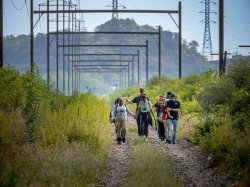College ‘Green Teams’ Tackle Pressing Environmental and Climate Challenges
Montclair hosts students from 30 universities to partner with communities, companies to solve sustainability concerns
Posted in: Homepage News, Research, Science and Technology

College students from 30 universities are tackling pressing environmental and climate challenges at Montclair State University this summer as part of the PSEG Institute for Sustainability Studies’ annual “Green Teams” program. These challenges include inequalities exacerbated by climate change, notably food insecurity in Paterson, flood mitigation in Washington Township, and the impact of replacing natural sports fields with artificial turf in Verona.
“We’re thinking big, we’re thinking long term, we’re thinking locally,” said Amy Tuininga, the institute’s director during the program’s launch on May 30. “We’re thinking through an environmental justice and a social justice lens.”
Since 2016, the Green Teams program has been a platform for launching students into internships, green jobs and graduate programs. Community partners sponsor teams of undergraduates who provide research, analysis and marketing to shift corporate culture. To date, that has included 290 real-world projects, with 370 students overall assisting 50 local communities, nonprofits and national and global companies advance their sustainability projects.
For corporate and nonprofit partners, this summer’s projects will include creating a plan to influence land-use laws in Northern Jersey as part of an environmental justice initiative, evaluating the effects of greenhouse gasses and aviation and detailing how a hospital could reduce emissions by introducing a fleet of electric vehicles.
A newly funded program will send students to Kansas State University to study agricultural technology to mitigate the food security crisis.
“This is a program about solutions,” said Montclair President Jonathan Koppell during his opening remarks to the students selected for Green Teams, donors, corporate and community partners, parents and University faculty and staff. “By generating solutions, you’re showing that all these problems that seem intractable, that seem impossible, that seem hopeless, can all be solved.”
Over the next 11 weeks, the program will introduce the 50 undergraduates to subject-matter experts, professors and leaders addressing the world’s most difficult challenges, including improving health conditions, environmental and economic risks, and the persisting impacts of climate change.
“Environmental justice has to be at the center of all of the work we do when it comes to environmental topics and issues, including climate change,” said keynote speaker Marccus Hendricks, University of Maryland associate professor of Urban Studies & Environmental Planning and director of the Stormwater Infrastructure Resilience and Justice Lab. “If it’s not, we do a disservice to the work itself and we’ll never get to where we need to be in terms of curbing the trajectory of global climate change.”
The undergraduates bring a variety of perspectives, coming from 40 different academic programs at colleges throughout the country, including historic Black and Hispanic-serving institutions. Final presentations of their work will take place on August 7.
Christiana Zenner, Fordham University professor of Fresh Waters, Environmental Values and Ethics, encouraged the students to think about goals they hope to achieve, both for the project they’ve been assigned and for the world they perceive. “What kind of civic and corporate responsibility do you want to encourage?” she asked.
The Green Teams are supported by corporate foundations and federal sources, including the PSEG Foundation, Constellation, the National Science Foundation, U.S. Department of Agriculture and NASA. To learn more about Green Teams, visit PSEG Institute for Sustainability Studies.
The program is part of a comprehensive summer schedule of learning experiences at Montclair State University. In the coming weeks, hundreds of high school students will learn about college life as part of the Hispanic Student College Institute and expanded Pre-College Summer Programs (which offers a variety of courses, including animation, acting, cybersecurity, sportscasting, pre-medical professions and Wall Street investing). Additionally, incoming freshmen will get a head start on earning credits through the Summer Bridge Scholars Program and the Educational Opportunity Fund’s Summer Academy.
Story by Staff Writer Marilyn Joyce Lehren. Photo by University Photographer Mike Peters.
You may also like:
Bristol Myers Squibb to Fund Research for Five CSAM Students
How Effective Communication Can Benefit Scientists
